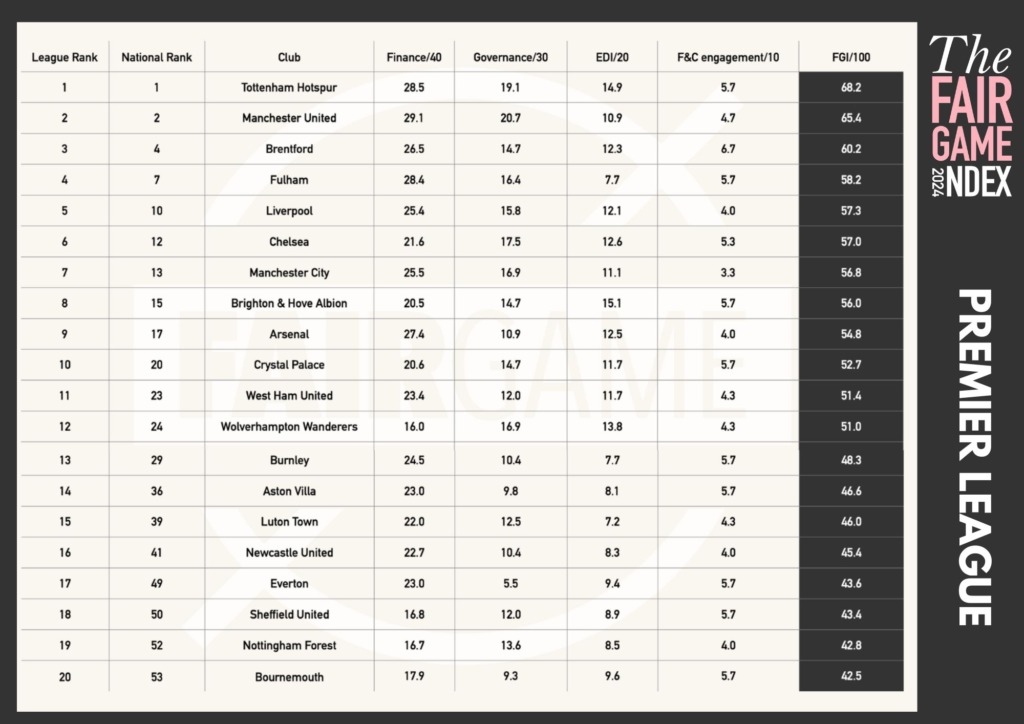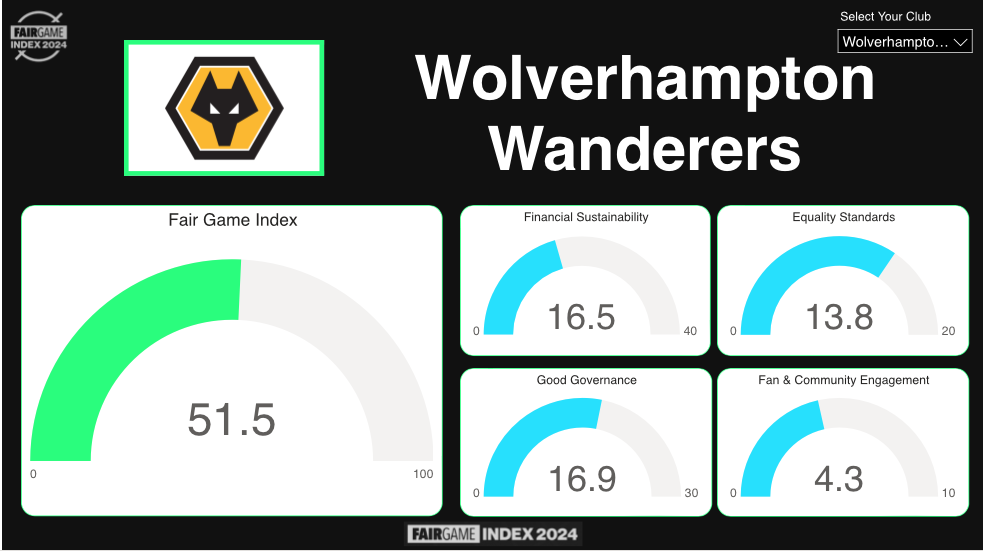WE TAKE A LOOK AT HOW WOLVES HAVE FAIRED IN THIS YEARS FAIR GAME INDEX
Wolverhampton Wanderers are facing scrutiny as they find themselves at the bottom of the Fair Game Index 2024 for financial sustainability. This prominent index shines a light on the financial health of football clubs, and Wolves’ position raises important concerns for both the club and the larger football community. With finances in focus, questions about governance and long-term viability come to the fore. Are Wolves managing their resources wisely, or is the lack of financial sustainability a harbinger of deeper issues? As we explore these challenges, the implications stretch far beyond Molineux, reflecting on the broader landscape of football management in England.
WHAT IS THE FAIR GAME INDEX?
The Fair Game Index 2024 is a comprehensive study that dives deep into the financial health and organisational strength of men’s professional football clubs across England and Scotland. But why is it important? This Index isn’t just about numbers and rankings; it’s about driving change in football. By evaluating clubs on multiple metrics, the Index promotes transparency and encourages improvements in how these clubs are run. Let’s break down its core elements.
Purpose of the Fair Game Index
In football, just like in life, not everything is as it seems. The Fair Game Index aims to pull back the curtain and reveal what’s truly happening behind the scenes. This Index evaluates clubs based on four key dimensions:
- Financial Sustainability – This examines whether clubs are living within their means, ensuring long-term viability without risking financial ruin. It includes measures such as accounting, debt, ticket pricing and sponsorship
- Good Governance – Clubs are scrutinised for transparency and accountability in their management structures. Draws on 55 different metrics and covers areas such as board structure, accountability and transparency.
- Equality and Ethical Standards – This aspect assesses how clubs promote inclusivity and uphold ethical practices, and covers a very broad range of topics from ethics to sexism, and from environmental impact to racism.
- Fan and Community Engagement – Evaluates how well clubs connect with their local supporters and contribute to their communities, including fan representation and community investment.
The goal? To ensure clubs aren’t just winning on the pitch, but also thriving as responsible organisations.
Measuring Financial Sustainability
Financial sustainability might sound like a buzzword, but it’s the backbone of any club aspiring to succeed in the long term. Without financial health, even the most talented teams can find themselves in hot water. The Index scrutinises various indicators like budgeting, debt management, and revenue allocation. It’s a bit like having a financial health check-up for your favourite club.
- Balanced Budgets: Are clubs spending within their means, or are they relying on risky loans?
- Debt Levels: How manageable is their financial debt, and are they making smart investments?
- Revenue Streams: Is there diversification in income, or do they lean too heavily on match-day earnings?
By assessing these factors, the Fair Game Index highlights where clubs stand strong and where they might falter.
How Premier League teams ranked


WOLVES BOTTOM OF PREMIER LEAGUE FINANCIAL STABILITY SCORE WITH 16/40
Wolves, find themselves at the bottom of the Fair Game Index 2024 in terms of financial sustainability. This ranking has raised eyebrows given the club’s stature in the English Premier League. Let’s take a closer look at what contributed to their low score and how it compares to other clubs. We have to remember that this score refers to the last set of accounts and not where the club stands right now.
For Wolves, improvement in these areas is not just an option but a necessity. The hope is that by addressing these financial touchpoints, Wolves can rebuild their foundation stronger. But how quickly they can adapt and rectify these issues remains to be seen.
Recent Financial Losses
Wolves have been facing some tough financial times recently. In the last reported period, the club experienced a significant £67 million loss. This financial hit has left both fans and analysts questioning the club’s economic strategies. With forecasts not expected to improve dramatically this season, the challenges continue to mount for Wolves. This level of financial loss shines a spotlight on potential inefficiencies and overspending, raising questions about whether Wolves can turn things around. Are they making the right calls, or is there a need for more prudent financial planning?
Overall Ranking in the Fair Game Index
Whilst Wolves found themselves at the bottom for financial sustainability, their overall ranking tells a more nuanced story. Wolves managed to secure a spot at 12th in the Premier League for overall fairness according to the index, which reflects various other aspects beyond just finances.
Positive Aspects Bumping Up the Total Score
Wolves may have stumbled in terms of financial sustainability, but they have certain strengths that improved their overall score. These aspects are equally crucial in shaping a well-rounded image of the club.
Governance Efforts: Despite financial challenges, Wolves have displayed reasonable governance practices. The club’s governance scores are bolstered by transparent board structures and accountability measures. This shows that even if money management is tricky, running a club responsibly is achievable.
Community Engagement: Wolves have created strong ties with their local community, reflecting a commitment to fan and community engagement.
Ethical Standards: While the club needs significant improvement in certain financial areas, Wolves have made strides in ethical and equality standards. They’ve been involved in initiatives promoting inclusivity and diversity, acting as a beacon of hope in an industry that sometimes lags in these areas.
Conclusion
Wolverhampton Wanderers’ position at the bottom of the Fair Game Index 2024 for financial sustainability is a stark reminder of the challenges many clubs face. Despite their 12th place in the overall Premier League fairness index, financial stability remains a pressing concern. The importance of managing finances strategically cannot be understated for Wolves and football clubs in general.
This result is not unexpected last summer the club made it very clear of issues with PSR and its need to raise funds through player sales. However all indications from the club were that Wolves would be in a better position financially by Summer 2024. However, so far we have seen big player sales and limited spending. All indications were that Wolves would need to sell to buy but that the club didn’t need to sell to balance the books as they did last summer. The BBC reports that Wolves made a net profit of £32.9m in this window so that should go a long way to straightening out the finances provided they don’t run the risk of relegation which would be financially costly.


1 Comment
by Paul Fradgley
I wonder how highly that fan engagement score will be the next time round (given the handling of the increase in prices)